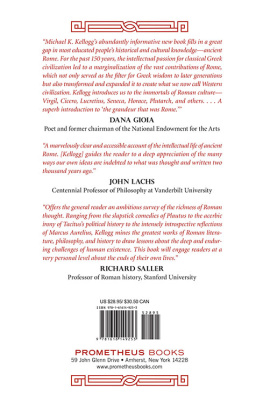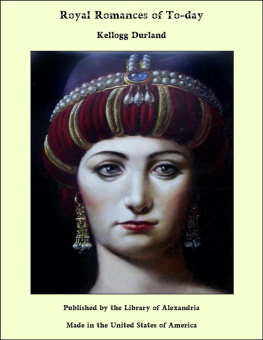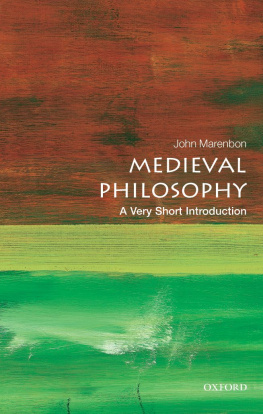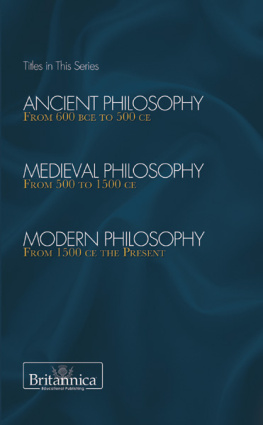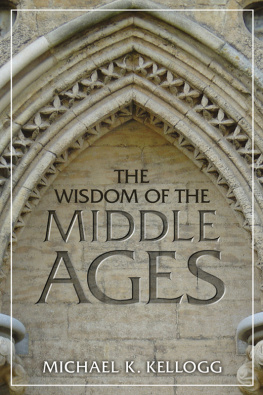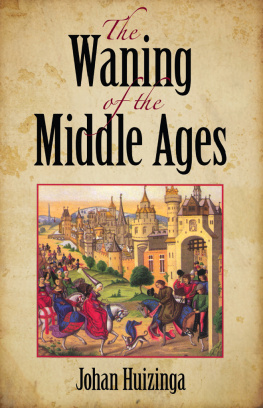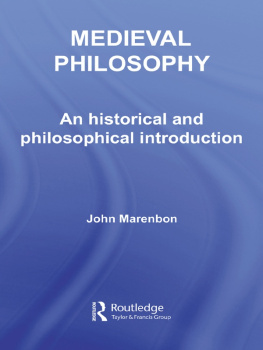
I have not tried to document every source for the ideas in this book. But my extensive debt to generations of medieval scholars and translators will be obvious to those in the field. I have tried to list the books and articles on which I most relied, as well as those from which general readers would most benefit, in the section Suggestions for Further Reading. I also cite there in full the excellent translations of R. S. Pine-Coffin, Joel C. Relihan, Seamus Heaney, Betty Radice, Glyn Burgess, William W. Kibler, Regis J. Armstrong, Ignatius C. Brady, Anthony Esolen, Mark Musa, Wayne A. Rebhorn, and others, from which the quotations in the text are derived.
Oxford historian Emily Winkler read the chapters as they were written and made numerous helpful suggestions and corrections. I benefited greatly from the writings of Boston College philosopher Eileen Sweeney, who also read the finished book and provided generous comments in support.
Darrin Leverette scrupulously polished the entire manuscript, checking the citations, the facts, and the prose. His intelligence, attention to detail, willingness to track down obscure sources, and sensitivity to the nuances of language were all indispensable. So, too, was the work of Susan Cohen and Bernadette Murphy, who carefully and thoughtfully read each chapter. My longtime assistant, Marilyn Williams, without whom I would never accomplish anything, kept the entire project on schedule and put the manuscript in its final form.
I was fortunate yet again to have Jade Zora Scibilia as my editor at Prometheus Books. She has a wonderful ear for language and a sharp eye for imprecision. The book is much improved thanks to her efforts. She was also, as always, a delight to work with.
My greatest thanks, of course, goes to my wife, Lucy, and to my three childrenBaird, Cole, and Camillewho sustained, encouraged, and inspired me throughout the writing of this book.
ALSO BY MICHAEL K. KELLOGG
The Greek Search for Wisdom
The Roman Search for Wisdom
Three Questions We Never Stop Asking

Christianity provided the moral and intellectual framework within which the medieval search for wisdom in western Europe was conducted. It became a monolithic framework, though neither as rigid nor as intolerant of pagan ideas as is often supposed. Yet the rise of Christianity was built on multiple layers of happenstance and irony. Jesus was an obscure and illiterate Jewish prophet from the tiny rural village of Nazareth who preached the repentance of sins and the fulfillment of the Hebrew scriptures. His disciples were Jewish. His target audience, with rare exceptions, was Jewish. Some thought he was the promised Messiahthe new King Davidwho would drive out the pagan Roman oppressors and, with God's direct intervention, reestablish a Jewish kingdom and restore the lost tribes of Israel. Jesus himself preached an apocalyptic vision derived from John the Baptisthe thought the end of the known world was near and that God would soon come in all his glory to punish the wicked and reward the pious. Jesus presented himself as God's last messenger before the coming day of judgment.
None of this came to pass, of course. No Jewish kingdom was established, the end of the world did not come, and neither the wicked were punished nor the good exalted. When Jesus created a disturbance at the Temple in Jerusalem, the worried high priest, responsible for maintaining good order, turned Jesus over to the Roman prefect Pontius Pilate, who responded quickly and brutally. Jesus was crucified for pretending to beor perhaps just because others acclaimed him asthe King of the Jews. The crucifixion itself attracted little notice. It was a common occurrence; two other perceived troublemakers were crucified with Jesus that same day. Jesus posed no real threat, as evidenced by the fact that Pontius Pilate did not even bother to move against his followers. But wild talk and public demonstrations were enough to warrant maximum punishment, particularly during the festival of Passover, when Jerusalem was filled with restless pilgrims reasserting their identity as the chosen people of God.
The Jews of Jerusalem quickly lost interest in Jesus despite the vigorous efforts of his brother James and various disciples. For them, the notion of a crucified Messiah was a contradiction in terms. Jesus's death on the cross was, in itself, sufficient proof that his message was false, notwithstanding claims about his subsequent resurrection. The Jews of Jerusalem went back to waiting for their true Messiah, the successor of King David, who would restore the Jewish people to prominence and autonomy. Some forty years later, an attempted revolt led by a Jewish nationalist sect known as the Zealots enjoyed some initial success. But it ended in the devastation of Jerusalem and the destruction of its Temple by the Romans, an event that, remarkably enough, Jesus appears to have predicted, though he thought it was God who would destroy the then-current Temple and rebuild it as the centerpiece of his kingdom on Earth.
The disciples had somewhat more success spreading the words and deeds of Jesus among the Hellenized Jews of the Diaspora who were scattered throughout the Mediterranean. Eventually, however, it was among the Gentilesthat is, the non-Israelite peoplesof the Roman Empire that his message took hold. The disciples adapted his words to fit the new audience. A spiritual kingdom of heaven for all persons began to displace prophecies of the imminent, earthly, Jewish one that was anathema to Rome. Tales of Jesus's miracles grew, and his resurrection became the central event that transformed the death on the cross from a punishment for sedition into a victory over death and a symbol of atonement for the sins of humankind. The story of his resurrection transformed Jesus himself from a Nazarene peasant, with no pretentions beyond carrying God's message to his chosen people, into the divine Christ, true God and true man, one in being with the Father.
Saul of Tarsus, a Jew and self-confessed persecutor of the early Christians, was the man most responsible for this transformation. Following his dramatic encounter with the risen Christ on the road to Damascus, the newly christened Paul proselytized tirelessly among the Gentiles and divorced the message of Christ from the laws of the Hebrew scriptures. Jesus himself said he came to fulfill the scriptures, not to challenge or change them. But Paul absolved Gentile adherents from circumcision, temple sacrifice, dietary restrictions, and other requirements of the Jewish faith. Paul had little interest in the historical Jesus; his writings, or those attributed to himwhich are the earliest in the New Testament and comprise thirteen of its twenty-seven bookscelebrate the theological construction that is the risen Christ.
Gradually, a new religion was created rather than an ancient one fulfilled. The gospels themselves were written from thirty to seventy years after the death of Jesus by people who did not know him directly but relied on frequently repeated oral accounts and other, now lost sources. Jesus preached in Aramaic. The gospels were written in Greek. The new Christians retained the Old Testament and claimed it as their ownsomewhat as Rome clung to the myth that it owed its origins to ancient Troy. A massive effort was even undertaken to find passages in the Old Testament that were fulfilled in Jesus. Accounts of Jesus's life (such as the birth in Bethlehem and the flight into Egypt) were then reshaped based not on history but on theology.
Next page

